1942
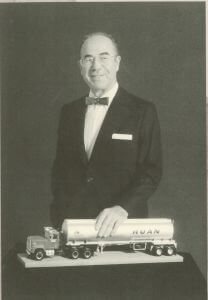

Twelve trucking executives representing three different organizations that were struggling to represent Iowa’s trucking industry came together and made the decision to form one association. Mr. John Ruan organized the meeting and by the end of the meeting, the Iowa Motor Truck Association was formed. Mr. James Brockway was named IMTA's first paid executive. Additionally, shortly after the IMTA was formed, the first official meeting of the IMTA Executive Committee occurred.
1943
The IMTA Article of Incorporation were signed by Lee Forsyth, John Ruan, and James Brockway. Additionally, the IMTA held its first official Board of Director's meeting.
1945
Governor Blue signed HF 243 which modernized limitations on truck sizes and
weights, this was IMTA’s first legislative victory.
1946
The first IMTA Truck Roadeo was held at the Iowa State Fairgrounds and over 5,000 spectators were in attendance for the finals. In an effort to create enthusiasm for the Truck Roadeo, Fruehauf donated this trailer as the grand prize. The second place prize was a 1946 Ford V8 Super DeLux automobile.
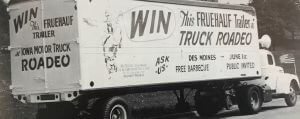

1951
The Iowa Council of Safety Supervisors organized as a division of IMTA.
1955
IMTA is now recognized as a powerful and effective voice for the trucking industry at the State Capitol. The trucking industry comes under attack for ruining Iowa’s roads. IMTA invests association dollars in critical research to identify the structure of highway taxation in Iowa. As a result of that campaign, IMTA launches a PR campaign entitled, “Trucks Pay Their Fair Share”. This campaign would be in place for the next decade and was extremely successful in educating Iowans and lawmakers.
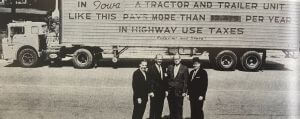

1967
IMTA celebrates its 25th anniversary and despite tremendous opposition, the association determined it needed to hold an annual ‘convention’ in conjunction with this annual meeting. The inaugural convention debuted in 1967 and for the first time ever, there was a registration fee imposed. It was a tremendous success and is a tradition that remains yet today with the management conference that is held each September.
1980
The Motor Carrier Act passed, and deregulation became a reality. IMTA leaders implemented an aggressive campaign opposing deregulation and even added a special assessment to the dues to cover the cost of the campaign. IMTA staff and board members hit the road and combed the state with press conferences and town hall meetings highlighting their concerns with deregulation of the trucking industry.
1987
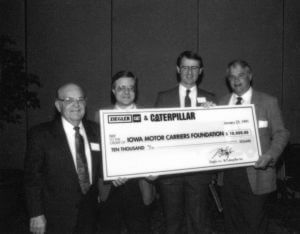

1988
Project I.M.T.A. (Investing in Tomorrow’s Adults) received recognition by the White House. Project IMTA was one of 100 programs from across the nation to receive a President’s Citation for Private Sector Initiatives for the positive contribution it made to communities from across the state. Project IMTA provided grants to Iowa high schools to help fund their after prom activities.
1992
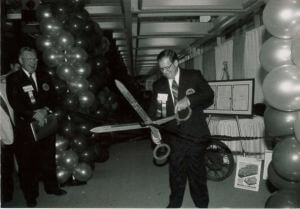

IMTA celebrates its 50th anniversary. A series of anniversary events are held throughout the year and throughout the state with the culmination of the celebration taking place in September with a three-day event that was wildly successful.
1993
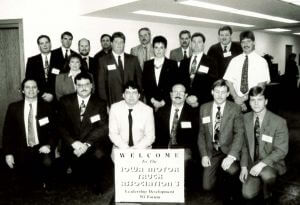

IMTA launched its first leadership class. There were 18 IMTA members that participated in the inaugural program that spanned over 5 days of various educational sessions.
1994
A land purchase agreement was signed for a parcel of land near the foot of the Iowa State Capitol. This part of Des Moines was very run down and considered to be a very “sketchy” part of the city. IMTA leaders faced criticism from the membership not only for the location but for pursuing building ownership.
1995


2008
Landmark “anti-indemnification” legislation is passed in Iowa. IMTA leaders began working on this effort in the summer months to educate lawmakers on the value of this legislation and the votes were easily secured for its passage during the 2008 legislative session. The same year, legislation was passed that allowed for 96,000 pounds on six axles to run on intrastate highways in Iowa. This controversial legislation highlighted the many differing opinions on truck productivity that were still prevalent in the industry.
2014
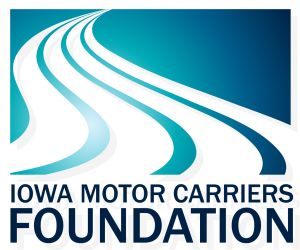

2015
After three years of hard work and ongoing lobbying efforts, a 10-cent gas tax is passed in the 2015 legislative session. The last gas tax had been passed in 1989. The influx of money into the Road Fund allowed for work to continue almost immediately on many important road projects that had stalled because of a $225 million shortfall.
2017


IMTA celebrates 75 years as the trusted voice of the trucking industry in Iowa. Throughout the year, events were held to commemorate the anniversary and to celebrate the same pride, passion and purpose that existed in 1942 when IMTA was formed. To conclude the anniversary celebration, an elegant and impressive gala was held at Hy-Vee Hall in Des Moines with over 400 people in attendance.
2020
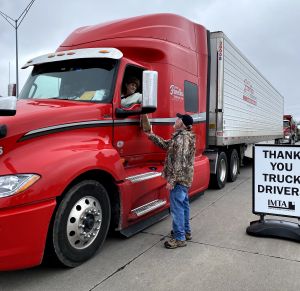

2023
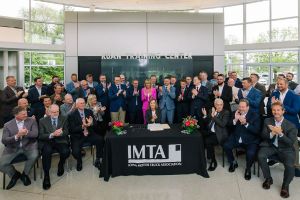

Lawsuit abuse legislation passes! The legislation went into effect as of July 1, 2023, and marked the end of a multi-year effort to get this historic lawsuit abuse legislation passed. The bill places a $5 million cap on noneconomic damages, such as pain and suffering, mental anguish, and loss of consortium by a spouse, parent, or children.
2024


